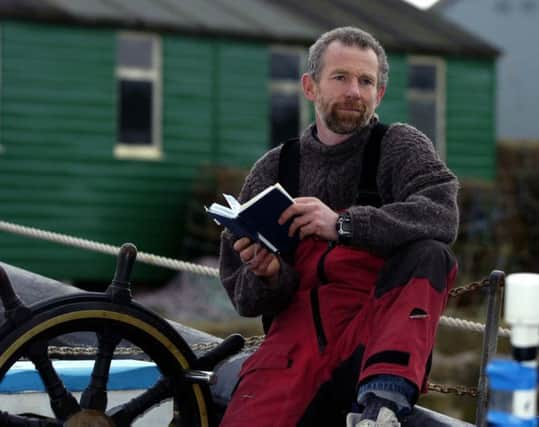Book review: A Book of Death and Fish


A Book of Death and Fish
Ian Stephen
Sarabande, 576pp, £18.99
His earliest poems were published in Denmark and Australia, aswim like the watery world they portrayed in the borderless currents of the imagination. In Providence II (1994) he proved his talents as a colourist in photographs of fish bled onto the page with tales of their inescapable fate – the fate we all share.
Death occurs early in A Book of Death and Fish, which is divided into two parts. Peter MacAuley, its narrator, now in the doldrums of middle age, dredges up his sharp memories in shoals, darting, glinting, evasive, poignant, recalling the sudden deaths of his grandparents – couples resident on the east or west coast of Scotland where the herring fashioned the fortunes of the people, on land or at sea.
Advertisement
Hide AdThe 1960s and 1970s spool and unfurl, twisting their ribbons of passing time, diced by the vagaries of MacAuley’s zig-zag recall into scraps, each little windfall filling a chapter (there are, all told, 104 of them), often so compact they read like short stories. This is not, of course, true to the nature of time at all, but by confounding its dislocation, Stephen brings a contained concentration and intensity to his chapters that is mesmerizing and true in a deeper way.
It could so easily have meant chaos, recollections recollected, a free-fall of scribbled, untrammelled images. But here we have a novelist (like his narrator, born in 1955) who has stayed his hand, has sifted and savoured his material – a life, no less – to be rendered into assembled precise particulars of the kind that evoke an era: cigarette brands (Gold Flake, Woodbine), domestic fuel (Esso Blue), children’s comics (Bunty, Eagle, Beano and Topper), the grannie who divvied out the fruit Spangles, and so on.
Peter’s sister Kirsty, a shadowy presence, leaves for Canada and nursing early on, nursing a secret revealed much later. Their parents, the Olman (the weaver father bred on Lewis) and the Olaid (the mother, a typist from the Broch) are the story’s planets around whom memories often orbit when not making tangents, magnetically pulled towards Peter’s intrigues enjoyed with friends as growing up he takes to the sea, goes to university (Aberdeen), later joining the Coastguard, and in-between, on a kibbutz, meets Gabriele, his future wife.
Their exchange of letters is part of Ian Stephen’s/Peter McAuley’s mixture of flowing writing styles. Peter’s story is accumulatively moving, told guilelessly by its narrator/guilefully by the author, (“I don’t know what this collection of writings was meant to be. It’s just happened...” says MacAuley. “This is degenerating into a diary – a life story. That suggests there ain’t gonna be no next time to make it better”).
Of course, we know this from the outset. The story, in truth, is MacAuley’s preamble to writing his will, the crab of cancer gobbling his bowel. Shorn of self-pity, laced with wit (“Stornoway has the architectural integrity of the average Scottish cemetery”), the novel’s fits and starts, digressions and stories tucked inside stories are a celebration of the Scottish oral tradition.
There may be readers who are irked by its mixture of memory, documentary and descriptive (often poetic, if restrained), and who find its poignant undertow insufficient to sustain them. If so, they will miss the increasing resonance of Book Two which is valedictory, often polemical – MacAuley’s gift, like that of Anna, the daughter he shares with Gabriele (from whom eventually he separates) is a well-sharpened sense of justice, and he expresses it vociferously and at length.
Advertisement
Hide AdHe leaves out a lot – the other relationships with women (with one exception) being foremost. “That’s what people do when they tell their stories. Leave bits out,” he says. “It’s all history once it’s happened.” This is simply a statement and not a defence. And it’s one of the merits of A Book of Death and Fish that the bits left out have not impaired the bits left in, and that the history and the moment enjoy a concurrence that makes the book live from first to last.